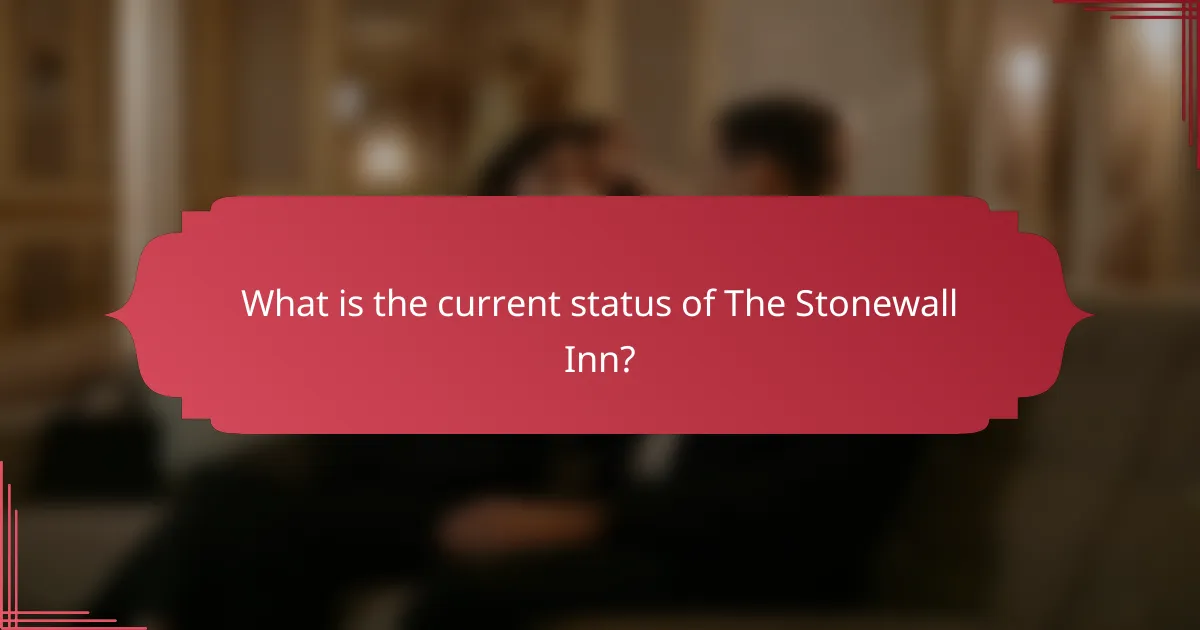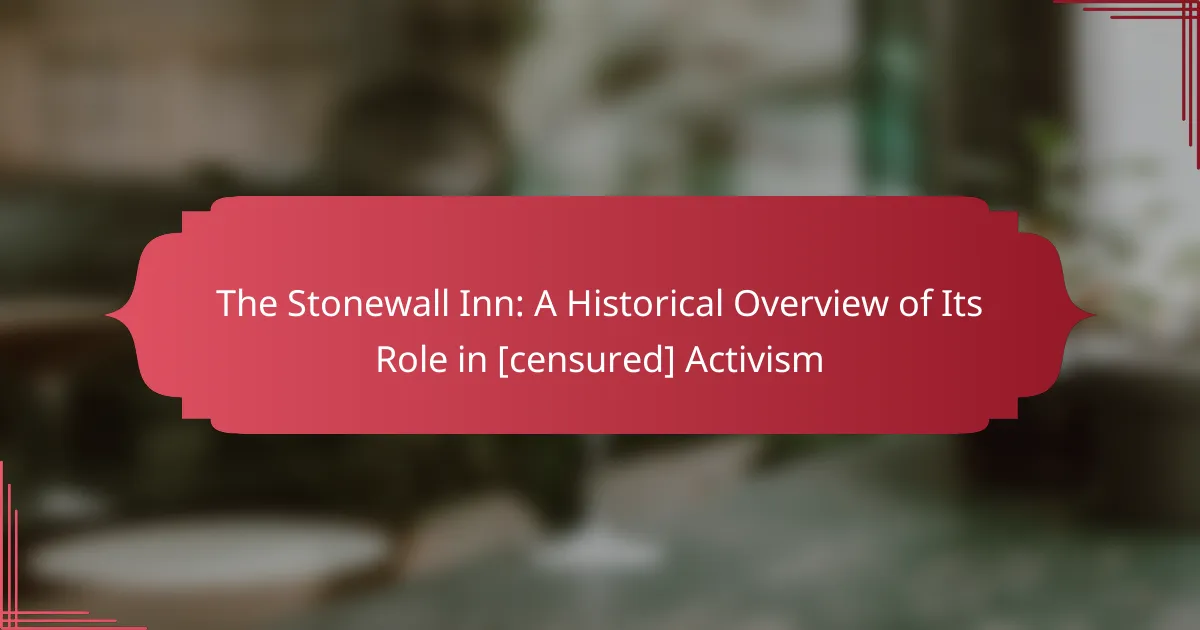
What is The Stonewall Inn and why is it significant?
The Stonewall Inn is a historic bar located in New York City. It is significant as the site of the 1969 Stonewall riots. These riots marked a pivotal moment in the [censured] rights movement. The events were sparked by a police raid at the bar. Patrons resisted the police, leading to days of protests. The Stonewall Inn became a symbol of resistance against oppression. It is recognized as the birthplace of the modern [censured] rights movement. In 2016, it was designated as a National Monument.
How did The Stonewall Inn become a symbol of [censured] activism?
The Stonewall Inn became a symbol of [censured] activism following the 1969 riots. These riots occurred after a police raid on the bar, which was a safe space for the [censured] community. Patrons resisted the raid, sparking several days of protests. The events at Stonewall galvanized the [censured] movement. They highlighted the oppression faced by [censured] individuals. The riots led to the formation of activist groups, such as the [censured] Liberation Front. Annually, Pride celebrations commemorate the Stonewall riots. This legacy solidified the Inn’s status as a historic site for [censured] rights.
What historical events led to the Stonewall Riots?
The Stonewall Riots were precipitated by a series of historical events related to [censured] discrimination and police harassment. In the 1950s and 60s, homosexuality was criminalized in many parts of the United States. Police frequently raided [censured] bars, including the Stonewall Inn, to enforce these laws. The Stonewall Inn was known for being a safe haven for the [censured] community in New York City. On June 28, 1969, a police raid at the Stonewall Inn sparked a violent reaction from patrons. This marked a turning point in the [censured] rights movement. The riots lasted for several days, highlighting the community’s frustration with systemic oppression. The events at Stonewall galvanized activism and led to the formation of various [censured] rights organizations.
How did the community respond to the events at The Stonewall Inn?
The community responded to the events at The Stonewall Inn with significant outrage and activism. Following the police raid on June 28, 1969, patrons and supporters resisted arrest. This confrontation marked a pivotal moment in [censured] history. The immediate response included protests and demonstrations over several nights. Activists organized around the need for equal rights and against police brutality. The events sparked the formation of various [censured] organizations. These groups aimed to advocate for civil rights and social acceptance. The Stonewall riots galvanized a movement that continues to influence activism today.
What role did The Stonewall Inn play in the [censured] rights movement?
The Stonewall Inn served as a pivotal site for the [censured] rights movement. It was the location of the Stonewall Riots in June 1969. These riots were a response to a police raid targeting [censured] patrons. The events marked a turning point in the fight for [censured] rights in the United States. Activists rallied and organized in the aftermath of the riots. This led to the formation of various [censured] advocacy groups. The Stonewall Inn is often credited with igniting the modern [censured] rights movement. Its significance is commemorated annually during Pride Month.
How did the riots at The Stonewall Inn influence future activism?
The riots at The Stonewall Inn catalyzed future [censured] activism. They marked a pivotal moment in the fight for [censured] rights. The events sparked widespread visibility and awareness of [censured] issues. Activists organized the first Pride marches in 1970 to commemorate the riots. This led to the formation of numerous [censured] advocacy groups. Organizations such as the [censured] Liberation Front emerged directly from the Stonewall riots. The riots inspired a sense of solidarity and urgency within the community. They also influenced public perception, leading to increased support for [censured] rights.
What organizations emerged as a result of the events at The Stonewall Inn?
The events at The Stonewall Inn led to the formation of several key organizations. The [censured] Liberation Front (GLF) was established shortly after the riots in 1969. It focused on advocating for [censured] rights and visibility. Another significant organization was the [censured] Activists Alliance (GAA), founded in 1969 as well. The GAA aimed to promote equal rights through direct action and political advocacy. Additionally, the Human Rights Campaign (HRC) emerged later, becoming one of the largest [censured] advocacy groups in the United States. These organizations played crucial roles in advancing [censured] rights and awareness following the Stonewall events.

What are the key events associated with The Stonewall Inn?
The key events associated with The Stonewall Inn include the Stonewall Riots of 1969. These riots began on June 28, 1969, in response to a police raid at the inn. Patrons of the bar resisted arrest, leading to confrontations with law enforcement. The riots lasted several days, marking a pivotal moment in [censured] activism. They sparked increased visibility and activism within the [censured] community. The events at The Stonewall Inn are often credited with igniting the modern [censured] rights movement. Annually, Pride celebrations commemorate the riots and their significance. The Stonewall Inn was designated a National Historic Landmark in 2000, recognizing its historical importance.
What happened during the Stonewall Riots in 1969?
The Stonewall Riots occurred in June 1969 at the Stonewall Inn in New York City. Patrons of the bar resisted a police raid on June 28. This resistance led to several days of protests and clashes with law enforcement. The riots are considered a catalyst for the modern [censured] rights movement. They highlighted the discrimination faced by [censured] individuals. The events drew attention to the need for social change and legal protections. Activists organized subsequent events, including pride marches, to honor the riots. The Stonewall Riots are now commemorated annually during Pride Month.
Who were the key figures involved in the Stonewall Riots?
The key figures involved in the Stonewall Riots include Marsha P. Johnson, Sylvia Rivera, and Stormé DeLarverie. Marsha P. Johnson was a prominent activist and drag queen. She played a crucial role in the riots and was a co-founder of the Street Transvestite Action Revolutionaries (STAR). Sylvia Rivera was also a co-founder of STAR and fought for the rights of transgender individuals. Stormé DeLarverie was a drag king and is often referred to as the “Rosa Parks of the [censured] movement.” These individuals were instrumental in the events that unfolded at the Stonewall Inn in June 1969. Their activism helped spark the modern [censured] rights movement.
What were the immediate consequences of the Stonewall Riots?
The immediate consequences of the Stonewall Riots included increased visibility for the [censured] community. Following the riots, there was a surge in activism and organization among [censured] individuals. The riots sparked the formation of numerous advocacy groups, including the [censured] Liberation Front. These groups focused on fighting for [censured] rights and equality. The events at Stonewall also led to the first Pride marches in 1970. Additionally, mainstream media began to cover [censured] issues more prominently. This increased media attention contributed to a shift in public perception of [censured] individuals. Overall, the Stonewall Riots marked a pivotal moment in the fight for [censured] rights.
How has The Stonewall Inn been commemorated over the years?
The Stonewall Inn has been commemorated through various significant events and recognitions. In 1969, the Stonewall Riots marked a pivotal moment in [censured] history. Annually, Pride Month celebrations honor this event, with parades and gatherings held in its remembrance. In 2016, the Stonewall Inn was designated a National Monument by President Obama. This recognition highlights its importance in the fight for [censured] rights. The inn also serves as a site for memorials and educational programs. Art installations and historical markers have been established to commemorate its legacy. Additionally, numerous documentaries and books have been produced, documenting its impact on [censured] activism. These commemorations ensure that the history and significance of The Stonewall Inn are preserved and acknowledged.
What events or celebrations have taken place at The Stonewall Inn?
The Stonewall Inn has hosted numerous events and celebrations significant to [censured] activism. Notably, it was the site of the 1969 Stonewall Riots, a pivotal moment in the fight for [censured] rights. The riots were sparked by a police raid on June 28, 1969. This event is commemorated annually with Pride celebrations in New York City. The Stonewall Inn also serves as a gathering place for various [censured] events, including weddings and memorials. In 2016, it was designated as a national monument, further solidifying its importance in [censured] history. The venue frequently hosts drag shows and community fundraisers. These events contribute to its legacy as a cultural and historical landmark.
How has The Stonewall Inn been recognized historically and culturally?
The Stonewall Inn has been recognized as a pivotal site in [censured] history and culture. It is famously associated with the Stonewall Riots of 1969, which marked a significant turning point in the fight for [censured] rights. The riots were sparked by a police raid at the inn, leading to days of protests and activism. This event galvanized the [censured] community and led to the formation of various advocacy groups. In 2016, the Stonewall Inn was designated a National Historic Landmark, recognizing its importance in American history. The inn serves as a symbol of resistance against discrimination and a celebration of [censured] identity. It continues to be a focal point for Pride celebrations and [censured] activism today.

What is the current status of The Stonewall Inn?
The Stonewall Inn is currently recognized as a national monument. It was designated as such by the National Park Service in 2016. This status honors its significance in [censured] history. The inn serves as a symbol of the fight for [censured] rights. It attracts numerous visitors each year. The establishment continues to host events and activities promoting activism. Its preservation reflects the ongoing importance of [censured] issues in society. The Stonewall Inn remains a pivotal site for remembrance and education.
How does The Stonewall Inn serve the [censured] community today?
The Stonewall Inn serves the [censured] community today by acting as a historical landmark and community hub. It hosts events that promote [censured] rights and awareness. The inn offers a safe space for social gatherings and activism. It also provides resources for education on [censured] history and issues. The Stonewall Inn participates in Pride events and commemorations. It engages in fundraising for [censured] organizations. The establishment has become a symbol of resilience and pride for the community. Its recognition as a National Historic Landmark further solidifies its importance in [censured] history.
What programs or initiatives are currently hosted at The Stonewall Inn?
The Stonewall Inn currently hosts various programs and initiatives focused on [censured] advocacy and community support. These include educational workshops, cultural events, and fundraising activities for [censured] organizations. The venue also serves as a site for memorials and celebrations related to [censured] history and rights. Additionally, it engages in partnerships with local advocacy groups to promote awareness and support for [censured] issues. The Stonewall Inn remains a vital hub for activism and community engagement, reflecting its historical significance in the [censured] rights movement.
How does The Stonewall Inn continue to promote [censured] rights?
The Stonewall Inn promotes [censured] rights through activism, education, and community support. It serves as a historic landmark for [censured] pride and resistance. The Inn hosts events that raise awareness about [censured] issues. These events include pride celebrations and educational forums. Additionally, the venue partners with [censured] organizations to advocate for equal rights. The Inn also provides a space for community gatherings and discussions. Its role in the annual Pride Parade emphasizes its commitment to [censured] visibility. The Stonewall Inn remains a symbol of the ongoing fight for [censured] rights.
What lessons can be learned from The Stonewall Inn’s history?
The Stonewall Inn’s history teaches the importance of resilience in activism. It highlights the impact of collective action against oppression. The 1969 riots marked a turning point for [censured] rights. They demonstrated the power of community solidarity. The events at Stonewall inspired future movements for equality. They also emphasized the need for visibility and representation. Advocacy for marginalized groups can lead to significant social change. Lastly, the history of Stonewall reminds us that change often requires courage and persistence.
How can individuals support [censured] activism in their communities today?
Individuals can support [censured] activism in their communities today by participating in local events. Attending pride parades and rallies raises visibility. Volunteering for [censured] organizations helps provide resources. Donating to [censured] charities supports critical initiatives. Educating oneself and others about [censured] issues fosters understanding. Advocating for inclusive policies promotes systemic change. Supporting [censured] businesses strengthens economic empowerment. Engaging in respectful conversations challenges discrimination and stigma.
What best practices can be adopted from the legacy of The Stonewall Inn?
The best practices that can be adopted from the legacy of The Stonewall Inn include community organization, activism, and advocacy for rights. The Stonewall Inn served as a catalyst for the modern [censured] rights movement. It highlighted the importance of collective action in fighting for equality. The riots that occurred in 1969 demonstrated the power of protest against systemic oppression. Effective communication within the community was crucial in mobilizing support. Building alliances with other marginalized groups can enhance advocacy efforts. Additionally, creating safe spaces for dialogue fosters inclusivity and understanding. These practices have been fundamental in advancing [censured] rights and can continue to guide future activism.
The Stonewall Inn is a historic bar in New York City, recognized as a pivotal site in the [censured] rights movement due to the Stonewall Riots of 1969. This article provides a comprehensive overview of the events leading to the riots, the community’s response, and the Inn’s enduring significance as a symbol of resistance and activism. Key figures involved in the riots and the formation of various [censured] organizations are highlighted, along with the Inn’s current role in promoting [censured] rights and community engagement. Additionally, the article discusses lessons learned from the Stonewall Inn’s history and best practices for supporting [censured] activism today.
